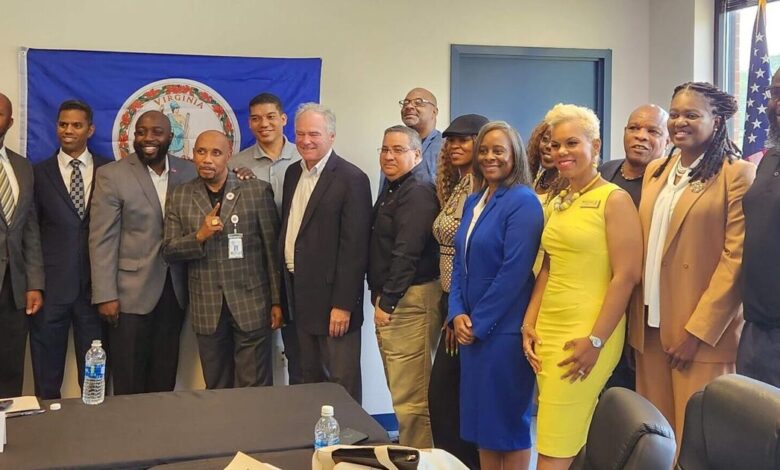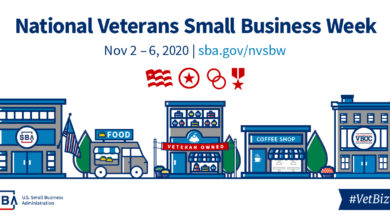Kaine hears veterans’ contracting concerns during swing through Northern Virginia | Headlines

According to U.S. Sen. Tim Kaine, government acquisition specialists might need to start thinking small.
Kaine, a Democrat, was in Dumfries Wednesday meeting with a roundtable of veteran small business owners, many of them government contractors who say they’re having a harder time getting a fair shake when competing for contracts.
“The contracts are still out there, but they’re getting very hard to compete for,” Byron Cherry, a 26-year veteran of the Army and the CEO of consulting and technology firm, Lead to Succeed, told Kaine. “A lot of contracts … $25 million or less, they’re full and open. And full and open means anybody can compete — Booz Allen, the big boys, and you can’t compete with them. You can try, but you can’t. And it makes it hard for the guys like myself and other small businesses because … a lot of this is who you know.”
A number of the veterans meeting with Kaine at the offices of TSI, a Dumfries-based technology consultant, said it hasn’t always been like that. Procurement officers were previously more willing to work with small firms as the prime contractor on small-dollar federal projects.
Now, they say, even when their firm is offering quality work at a lower price than the major contracting juggernauts, they’re being overlooked.
“The big companies now, they get their share and our share as well,” said Lonnie Bellamy Jr., an Army officer veteran and CEO of TIME Systems, an information technology firm.
According to Bellamy, big firms are still eager to use small businesses as subcontractors, particularly when their status as a veteran-owned, minority-owned small business helps them win the contract.
“But it doesn’t trickle down to … actually showing up as dollars through the small businesses,” Bellamy Jr. said. “Full and open is definitely not fair and open, I think that’s the government’s biggest problem because it’s causing a lot of secondary effects where the talent pool of highly talented individuals, they see this and they’re making choices specifically not to work in the government space.”
The numbers seem to back up Cherry’s and Bellamy’s concerns. Last year, according to a report from HigherGov, the number of small businesses receiving prime government contracts continued to decline. There were over 400,000 small businesses registered to contract with the government but only 58,000 small businesses actually received federal contracts, below half of what that number was in 2010. This was despite the federal government’s goal of expanding the use of small contractors.
That said, the size of the contracts that small businesses received did increase last year, growing to an average of $2.7 million per contract, up 9% over 2021, according to the report.
Government contracting wasn’t the only topic discussed at Wednesday’s roundtable event. Several business owners expressed frustration at the Small Business Administration, its at-times convoluted financing programs, and how the Department of Veterans Affairs has trouble reaching vets with its educational offerings.
For some, they said, the specialized government programs for veterans businesses aren’t worth the lengthy and arduous application process. And in the civilian business world, said Donnell Johns – a 26-year veteran of the Army who now runs Veterans Growing America, a showcase shop for veteran-owned businesses in Woodbridge – there’s also a stigma that’s sometimes attached to veterans.
“We invite those organizations that can support business education and employment resources and let [veterans] know that they’re not out there by themselves,” Johns said. “The civilian community, they don’t know what a veteran looks like — there is no veterans uniform. So now … they think … almost every organization out here that supports veterans are PTSD, suicide, homelessness organizations. So we’re trying to be that voice for the veteran to show America that we’re leaders.”
Kaine, who also met with constituents in Stafford and Fredericksburg Wednesday, said he liked the idea of a region-specific group of small contractors, especially veteran- and minority-owned, getting funding to help direct resources, contract and grant opportunities to other small businesses in the area. He said he might be able to try to get some funding for one into a spending bill as congressionally directed spending, the new term for the earmark process.
“The earmark process for this year for applying is done, but we’ll start on the next process immediately, and something like that could be very helpful,” Kaine said. “We’re now noticing the trend [with appropriators] that consortiums are good, if it’s a little bit regional that helps … Veteran-owned businesses, minority-veteran businesses that want to climb the entrepreneurship ladder, I know the appropriators are going to look at that.”



